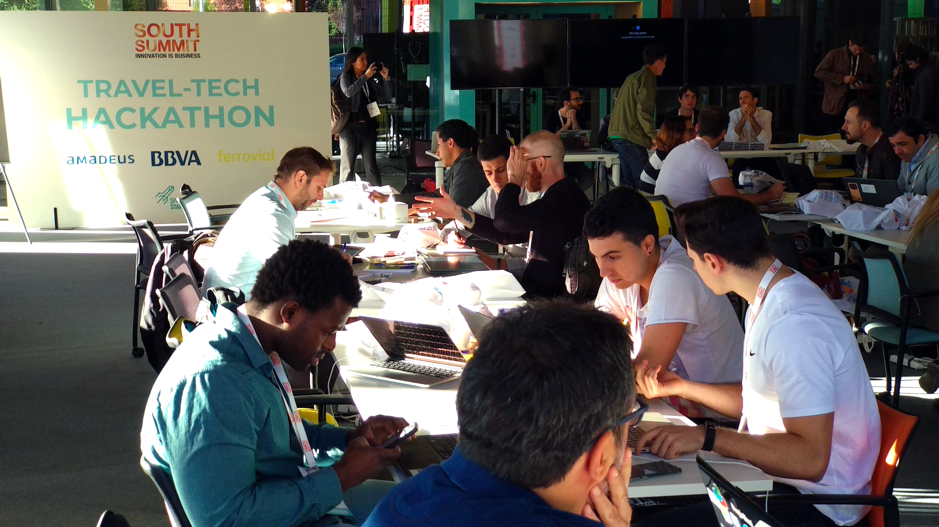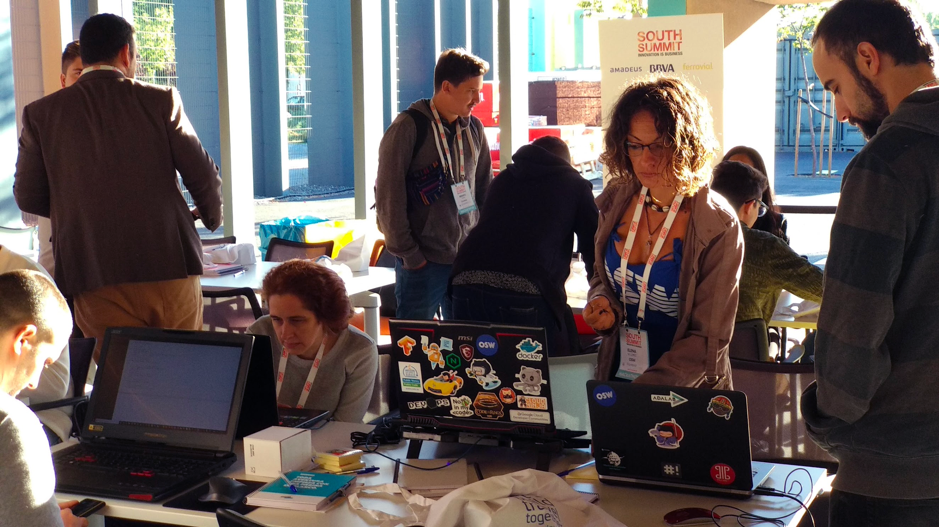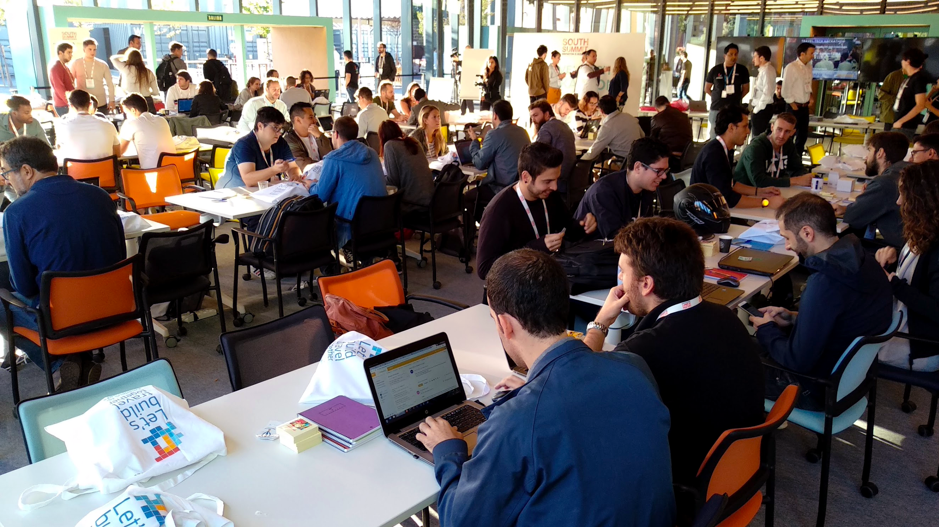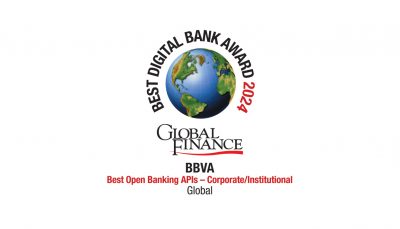Some 70 people, most of them between the ages of 20 and 35, came together on Tuesday October 2 at the N@ve de Madrid and formed 14 teams to present one proposal per team. There were four prizes: one overall and the other from the partners (BBVA_API Market, Ferrovial and Amadeus), each of which proposed their own challenge. This is the chronicle of 12 hours of intense creativity, innovation and a great deal of talent.
“The best way to predict the future is to create it.” This famous phrase of Peter F. Drucker, the well-known Austrian guru, is also that chosen with a clear intent by Santiago, one of the young participants in the South Summit Hackathon 2018 to answer the question “What are you doing here at nine o’clock in the morning on a Tuesday in front of a computer with people you’ve just met?”
There is no doubt that Drucker’s illustrates very clearly what was experienced on the day before the start of the South Summit, the main global entrepreneurial event for the south of Europe and the whole of Latin America. On an unexpectedly cold morning, dozens of young people, most of them in their twenties and none more than their thirties, crowded around to listen to the indications of the organizers of the hackathon. Basically, this meant that the three event partners proposed three challenges related to the travel industry to which they had to respond with their minimum viable product (MVP) proposals in less than 12 hours.
A few minutes after the start of the countdown the nerves became palpable: the teams were forming and discussing their proposals. The prizes encouraged them to look for the factors that would make their proposal different: four prizes of 1,500 euros each, one overall and one each from the partners. “Our proposal is called Tripper. It helps people who don’t know each other to meet and travel together to a destination that suits all of them,” explains Ricardo, who is 31 years old. Next to him, Andreina, 29, tells us she has just completed a specific programming course for women, and that “thanks to this hackathon, I’ll get my first experience as a front-end programmer.”
Out of the box
The two form part of the same team, but they didn’t know each other at all until today. That is very common in these kinds of events. It helps unlock creativity, to think out of the box, as the entrepreneurs like to call it.
But it is not only the participants who are looking for this out-of-the-box experience. The organizers are as well, and that is why these kinds of events tend to be seen as a win-win. Ricardo Segoviano, Head of BBVA API Market, confirms it: “We want to get closer to the innovation ecosystem, to other perspectives on how to do things.” Segoviano stresses the importance of openness for growth and to offer the best solutions and opportunities for his customers. “For us, it’s very important to expose ourselves to new ideas and to the feedback that they give us on our APIs. Having different perspectives on your solutions is extremely enriching, and these people give you that in a very generous and very positive way,” he concludes.
He is referring to the participants, who despite the stereotypes, are not always programmers. “I’m a specialist in Marketing and Business Development. I’ve just met them and I think that there is a good synergy,” says Elena Aznar, who confirms that not knowing your team in a hackathon is sometimes more of an advantage than an inconvenience. It’s normal practice in other similar events, such as the Startup Weekends organized by Google around the world. Participants also have expectations that go beyond the prizes: “We hope to get useful feedback outside the team, because sometimes you get very fond of your idea and don’t see its faults.”

The teams are prepared for 12 hours of hard work to achieve a minimum viable product around the three challenges
As well as this, the entrepreneurs can see for themselves directly the power of the APIs to speed up and simplify their proposals. “These innovators can find tools in BBVA_API Market that allow them to resolve critical moments, such as a payment, a KYC [Know Your Customer] moment, knowing how the economy and commerce works in a certain zone of interest, what offers are more or less in demand, etc.” explains Segoviano. His namesake Ricardo, who is a participant, confirms it. “We can get information from them that would be very expensive to achieve by ourselves: prices, destinations, payments, etc.”
The winners
Once the 12 hours of intense work on the MVP was complete, it was time for the verdict. At the start of this race against time the three partners in the hackathon had already made clear their criteria for the decision and award of the prizes.
In the case of BBVA API_Market, “innovation and originality will be key to making the decision,” explains Segoviano. But not only that, he adds: “Also, functionality and the level of development: how this good idea has been transformed into a specific solution. And also the commercial viability of the proposal, of course.” The organization highlighted above everything else the enthusiasm of the participants, their attitude to work, sense of comradeship and quality of the projects: “It’s really worthy of praise that they managed to get these results in only a few hours of work,” explains Diego Docavo, co-founder of Spanish Startups, the company that coordinated the event.

A moment of the hackathon on October 2 at the facilities of La N@ve.
Finally, after a difficult deliberation, the four winning teams were chosen: the overall prize for “My Travel Budget” by “MR Code”; and the BBVA_API Market prize for “Comarch” by “Spaces”, as mentioned above; the “U-Hack!” team with the project “AirTreep”, which won the Amadeus prize; and the team “Cool Fusion” for the project “Airport Experience”, which won the Ferrovial prize.
Winning, of course, is the goal of any participant. But the experience includes a lot more than a prize. This is displayed clearly by Santiago and his team, made up of Carlos, Isabella and Paula. They may not have taken a prize home, but they embody perfectly the spirit of this intense day; and in fact the basic motivation of any entrepreneur, of any non-conformist who wants to change the world for the better: “I’m always thinking of innovative solutions to problems that many people may have.”




























